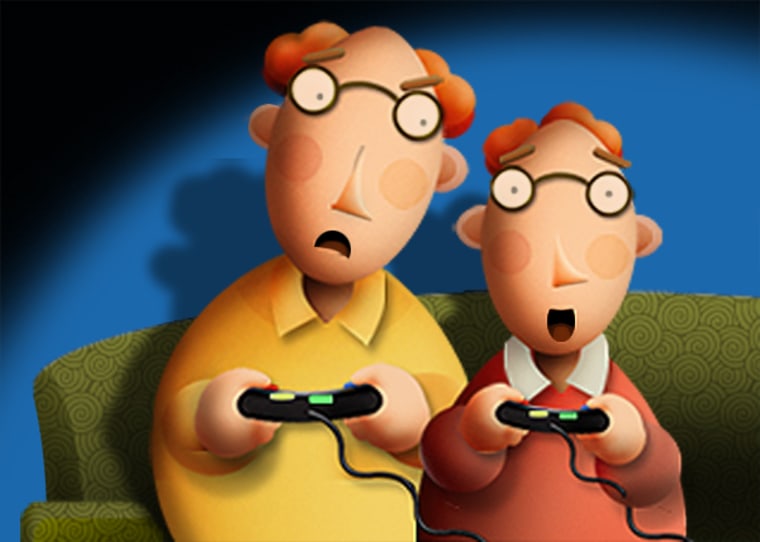On weekends, in between the soccer games and the household chores, you can find Brian Albright and his 12 year-old-son, Caleb, playing video games together.
Over the years, the two have played through “Sly Cooper,” the “Lord of the Rings” games and “Final Fantasy” on the family PlayStation 2. These days, father and son like “Star Wars Battlefront” and racing games like “Midnight Club 3: Dub Edition.”
“He really likes pimping out the cars,” says Albright of his son.
Albright, 38, says he’s the only dad among his son’s friend group that plays games with his kids. This jives with a recent AOL/Associated Press poll that showed four in 10 parents never game with their game-playing kids. “It’s such a waste of time,” one parent was quoted as saying.
Parent-child bonding
But is it? Or is gaming with your youngster a way to grow closer, teach lessons — and have fun in the meantime?
Albright thinks so. “It is a shame that parents don't see this as an opportunity for bonding, communication and supervision,” he says. “Clearly, boundaries need to be set, but there are way more positives than negatives.”
This dad has strict rules about gaming in the family’s Seattle home. Screen time — be it gaming or TV-watching — is limited to weekends only. And that’s only if Caleb gets his schoolwork and chores done.
Like many 12-year-old boys, the younger Albright has a hankering for games with gunplay, like “Halo 3” or “Call of Duty 4.” But you won’t find those mature-rated titles in the Albright household.
Choosing — and squelching — titles has proven to be a teaching opportunity for the Brian. He says that while he initially thought a game like ”Call of Duty 4” might teach his son about the realities of war, the hyper-real graphics changed his mind.
“Games where you’re an actual soldier in combat I have trouble with,” he says. “I find that it’s more like a numbing effect to the harsh realities of war.”
But the push-pull between father and son led to frank conversations about war, the military and politics — heavy, real-world topics raised because of video games.
A teachable moment
“I think that what he’s doing is basically the essence of parenting, which is to say, find a way to have teachable moments,” says Don Shifrin, a Bellevue, Wash.-based pediatrician and co-chair of the American Academy of Pediatrics council on communications and media.
“You could have the same sorts of discussions about music lyrics, and you could have the same sorts of discussions about Jamie-Lynn Spears, or drinking on ‘Friday Night Lights.’”
Tammy McCoy, of Findlay, Ohio, says online games helped teach her 17-year-old son, Trevor, important lessons about respect — and sportsmanship.
“No matter how bad you lose, you can’t be a jerk about it,” she says. “You say ‘good game’ and move on.”
The two started playing together when Trevor was just 7 years old, beginning first with family-friendly Nintendo games such as “The Legend of Zelda,” which McCoy says were as fun for her as it was for him.
“If he couldn’t do something and I could — the big hugs I’d get were so rewarding,” she says. “So was the pride in his face when he accomplished something.”
McCoy, a single mother who has raised Trevor alone since he was just six months old, says gaming together was critical in cementing closeness.
“Being a single mother to a son can offer many gaps,” she says. “Gaming became a way to bridge the gaps — which is what helped to make our bond even stronger.”
Strict gaming rules
McCoy says that like Albright, she had strict rules with Trevor regarding gaming. For one thing, mom always needed to be in the same room as her son as he played. This became more important as Trevor graduated from Nintendo games to online games like “World of Warcraft,” where sexual suggestions between players can accompany the game’s quests and dungeon raids.
“[It’s] given me the opportunity to sit down and explain to him, ‘Look, someone may say this to you, but it could be a naked 500-pound man in Wisconsin — and you need to let me know about it,’” says McCoy.
Albright says his gaming chops have allowed him to be considered almost a peer with his son and his friends, enabling him to slip into a room unnoticed and check in as they play.
“In this pre-teen era that we’re in with our son, [it’s] critical to be welcome with friends,” he says. “If I can be included and accepted, I can clearly keep an eye on things. Friends get comfortable and all of a sudden start swearing or say something completely inappropriate and I’m able to address that on the spot.”
Of course, bad behavior, sexual innuendo and foul language weren’t invented with video games. And gaming is just the most recent entertainment medium to come under fire, with headline after headline proclaiming the ills that console time can bring: obesity, numbness to violence, and withdrawn, anti-social behavior.
But the same argument was applied to television not so many years ago, says Shifrin. And we know what happens when parents make an activity absolutely taboo: It becomes all the more seductive.
“These are electronic devices that we’re going to have to learn to live with, rather than avoid. It’s much the same way that we talk about guns in America … we’re going to have to learn to live in a society with guns, and with violence,” he says. “It’s the same way with video games. It’s not something that parents can avoid, and if they do the youngsters will find them anyway.”
What do you think about parent-child game time? and share your stories and opinions. Selected responses may be published.
